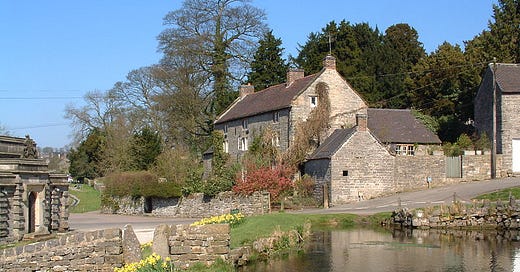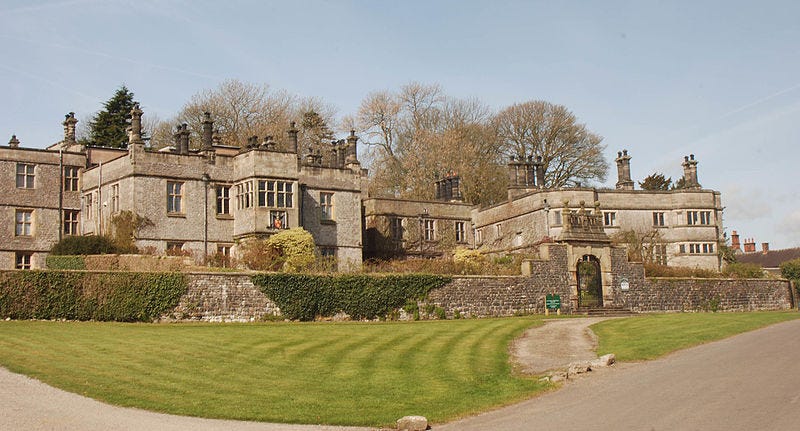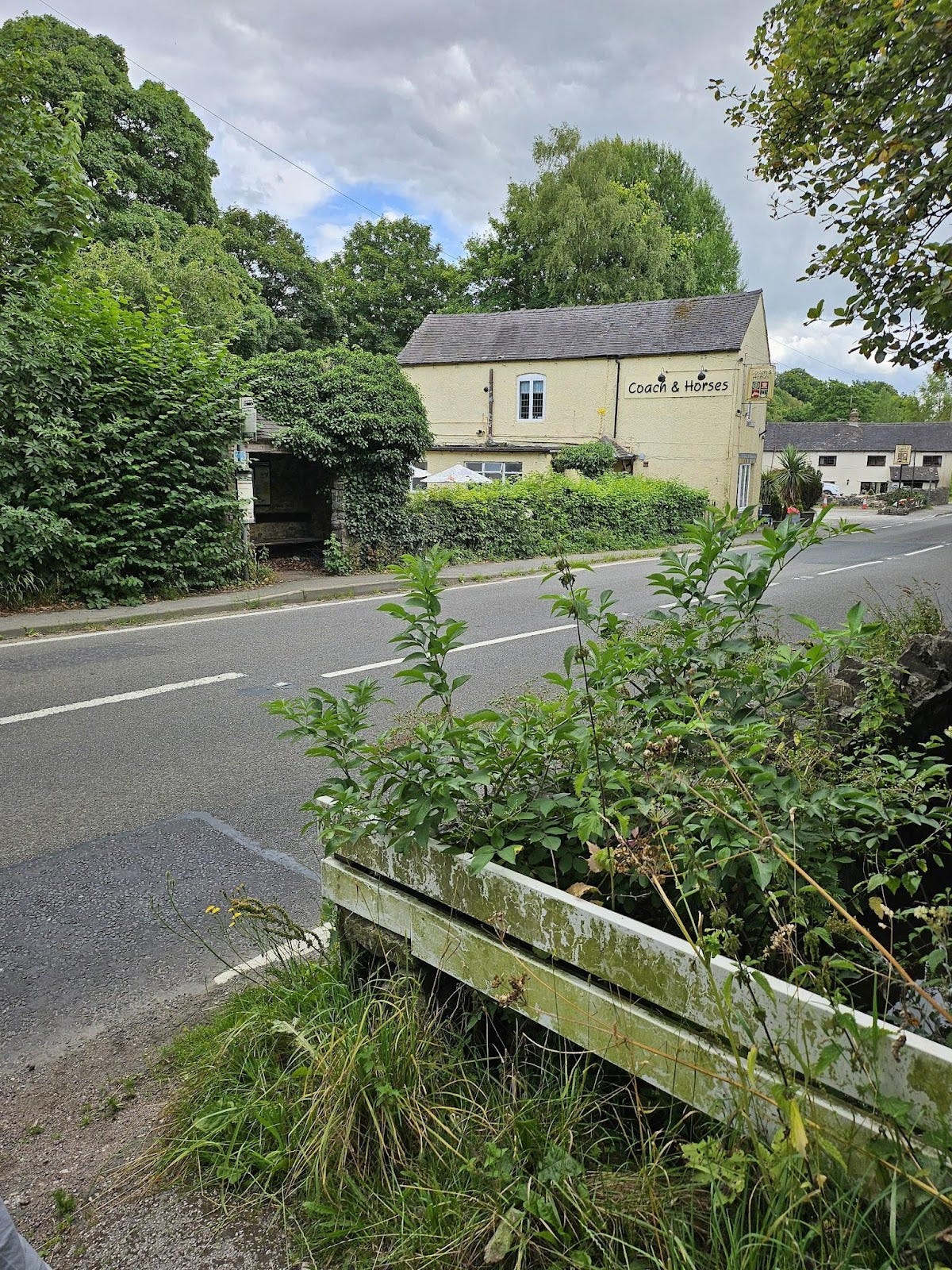Let me set the scene for you: 2 PM, warm and sunny, on the Tissington village green. Penny and I lounge on a bus bench, eating ice cream, hot, tired and dusty from a four mile hike along the rail-to-trail line from Ashbourne to Tissington, a steady uphill. We know the trains had it hard because we occasionally find the black clinkers shot out from the heaving coal locomotives that once strained up the incline. We are waiting on the bus to take us back to Buxton. The bus is late. To our left looms Tissington Hall, stately home of Sir Richard FitzHerbert, 9th Baronet of Tissington. To the right on a rise is the village church, St. Mary’s, with its fine Norman tower. Tissington Hall is closed today, rented out for a special event, a wedding, that is just letting out of the church. We gossip about the elegant wedding party traipsing across the village green from the church to the house, at a distance of about 50 yards. We talk about the church bells ringing the tidings of the new marriage, sounding a monotonous ding, dang, dong rather than a happy cacophony of ding, dong, dang, ding, dong.
A casually dressed middle-aged man sets aside the event traffic signs blocking the road. He calls over to us.
“These signs just snarl up traffic. They’re completely unnecessary. Are you waiting for the bus?” We tell him we are, and are concerned the bus is late. He walks over.
“Yes, the bus can be late. I’m Sir Richard FitzHerbert. I own this village.” I stare back at him.
“What did you just say?”
“I’m Sir Richard FitzHerbert. I own the village. Are you from America? What part?”
We tell him we live in Oregon.
“Yes. One of my ancestors had a mountain named for him there. St. Helens? It blew up, didn’t it? Ha, ha.”
I’m having trouble maintaining the conversation. He continues, “Where are you staying?” We tell him Buxton.
“Yes. Well, our village has a couple of good holiday lets and you should stay here next time you come. I’m going to get you some reading material while you wait. Don’t go away.” He walks across the village green exactly like the man who owns the place, disappears, and returns with a packet of materials. It includes a slick monthly magazine, Derbyshire Life.
“I write for it, you know. A column. It keeps me out of trouble, ha ha.” His packet of materials includes a little brochure on Tissington.
“Addresses for those holiday lets are here,” he says, indicating the brochure. “I’ll see you in the village next time you come. Hope you get your bus. There’s a taxi stand in Ashbourne, but that won’t help you, will it?”
And with that, he was off.
The bus never came. The friendly man who answered the phone for High Peak buses apologized (“There’s some kind of event going on in Tissington. Bus can’t get through.”) and instructed us to walk the mile from the village out to the main road, which we did.
We caught the bus going south into Ashbourne, knowing it would turn around and take us back to Buxton. As we bounced along we told the driver our tale of woe and he commiserated. “Aye, there’s sum’et goin’ on there, I cain’t get in,” he replied in an accent we’ve come to associate with the North Country. I stifle the urge to shout that I know, I was just there. He can see I’m agitated.
He stops to pick up a passenger. They exchange pleasantries and then he turns to me. “Tell ya wot. Whyncha two go git yerselves a cuppla pints here.” He points to a dowdy pub by the side of the road. “I’ll be back to pick yas up in about 45 minutes. You be waitin’ right there,” he points across the road, “and I’ll look for ye.”
We thank him and do just as he tells us. At the Coach and Horses, we look through Derbyshire Life. Sir Richard’s column is a little sad, about folks in Tissington who are leaving or retiring. He tells a little story about the Tissington Hall mouser, a faithful cat who just died.
We tell the publican, an older gentleman wearing a neat tie, about our chance encounter. “So ya met Sir Richard? He’s a good egg.” We gossiped about him and the village. His ex-wife got one of the village houses in a divorce settlement and sold it, freehold, so now he doesn’t own every house, the owner laughed. The house has a satellite dish on it. He can’t make them take it down. (Freehold means you own the land under your home; leasehold means the land is owned by the lord of the manor.) Sir Richard doesn’t get any of the money from his ancestral leaseholds, we’re told; it’s all tied up in a trust for the village these days. We thanked him for pulling our pints and then carefully crossed the busy road, looking both ways but still scared we’ll miss a lorry speeding from an unexpected direction.
Right on time, the driver picks us up and refuses to let us pay. “Ye’ve had enough excitement.”
As we pass the sign for Tissington, the driver leans over, “That be Tissington Hall there. One of the stateliest halls in all England, they say. Sir Richard FitzHerbert live there.” The driver turns to us, eyes wide. ”He own the whole village.”








Yes, but we're still looking for a good one....
Excellent short story! Very O. Henry!